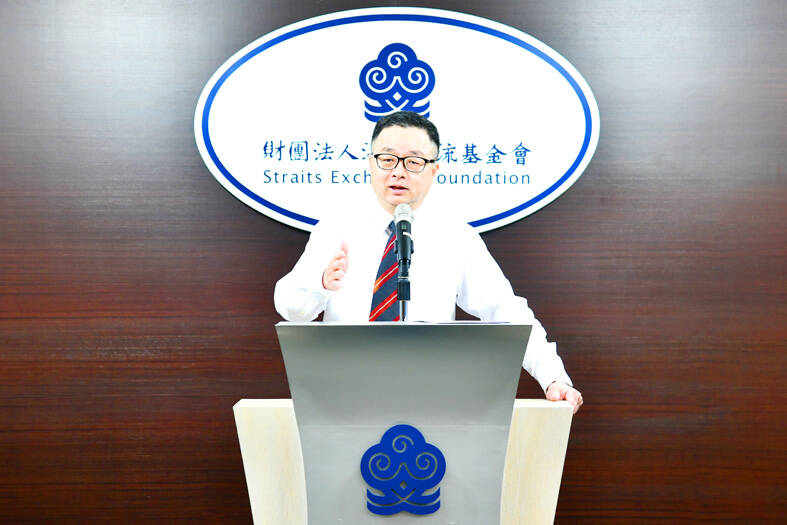-
By Chung Li-hua
and Jake Chung /
Staff reporter, with staff writer
More than 25 percent of China-based Taiwanese businesses are considering terminating their operations in China, with 50 percent looking to increase investments into non-Chinese supply chains, given the US’ tariffs, Straits Exchange Foundation (SEF) Secretary-General Luo Wen-jia (羅文嘉) said on Friday.
US President Donald Trump on April 2 imposed a 32 percent tariff on imports from Taiwan, but one week later announced a 90-day pause on its implementation. However, a universal 10 percent tariff was immediately applied to most imports from around the world.
On April 12, the Trump administration exempted computers, smartphones and semiconductors from the new tariffs.

Photo courtesy of the Straits Exchange Foundation
Taiwanese businesses most affected by the situation are those with operations in China that primarily export their products to the US and have low gross profit margins, Luo said.
Companies that cater to China’s domestic market are the second-most affected, Luo added.
US tariffs have significantly affected the imports of materials and components for China’s domestic markets. As a result, products that were previously stored are now being sold domestically, increasing competition, he said.
Although electronics, information technology (IT) products and semiconductors are less affected, the Mainland Affairs Council urged business owners to wait and see how the Chinese market reacts, Luo said.
The consensus among Taiwanese businesses in response to the short-term uncertainty brought about by US tariff policies is to increase investment in non-Chinese supply chains, and bolster the resilience of regional supply chains to weather the effects of the changes in the international economic order and geopolitical shifts, Luo said.
The SEF also reminded Taiwanese businesses to be careful of investment risks, he said.
Meanwhile, in view of the coming summer break for students, Luo said that travelers to China should be wary of youth start-up assistance groups and youth culture interaction groups.
They could be a cover for scam groups, he said, citing as an example an incident in which the Chinese Youth Entrepreneurs Association used identification documents from tour group members to apply for loans for Sichuan’s youth start-up zone, he said.
Culture interactive groups could be a front for cheap tour groups or groups that focus on political propaganda and “united front” rhetoric, Luo said.
The number of people who are missing due to those reasons varies, but even one missing person shows that there is a risk of “disappearing” when traveling to China, he said.
The SEF would publicize those cases while maintaining the anonymity of the people affected to promote greater awareness of the risks associated with traveling to China, he added.








